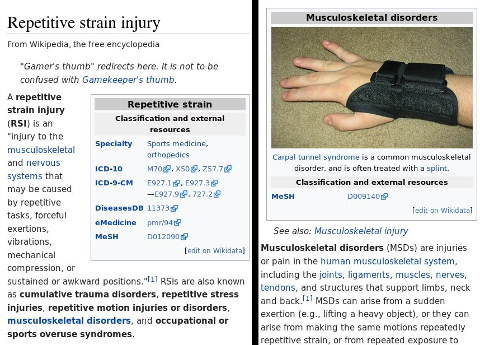Battistelli lauds himself, claiming decrease in sickness by merely denying people's health problems (cruel, irresponsible, and possibly illegal)

References: Repetitive strain injury and musculoskeletal disorders
Summary: The unpleasant truth about the health effects of EPO work and the strain induced by a management which is in deep denial about it, motivating people to just hide their suffering, disability etc. (for fear of invalidity, incapacity, ultimately dismissal)
RECENTLY, EPO management publicly bemoaned complaints from staff that the tools available for the job were unsuitable (e.g. incapable of detecting prior art through searches, not ergonomic and so on), but there are very legitimate concerns and unless staff is permitted to express/voice these concerns, people will suffer and some may eventually die young.
Today we decided to take our coverage of EPO up a notch, as big things may be about to happen. For those just joining us (we received about 30,000 views on our EPO wiki page yesterday alone), here are the previous 6 parts of this series, which is a must-read for insiders and also concerned outsiders, who include eminent politicians:
How many people out there know about Upper Limb Disorder (ULD) at the EPO? It's somewhat of a taboo subject. "Upper limb disorders (ULDs) affect the arms, from fingers to shoulder, and neck,"
says the British government. "They are often called repetitive strain injuries, 'RSI', cumulative trauma disorder or occupational overuse syndrome."
"The problem was so big in fact that the EPO itself had several external studies commissioned on ULD. In 2004, for example, the Dutch research institute TNO concluded that some 40% of EPO workers had ULD."I've had one or two colleagues with that issue, but that represents less than 5% of the whole. In the EPO, statistically speaking, this is an epidemic that just leaps off the scale.
"You articles about medical aspects at the EPO caught my attention," one reader told us. We soon learned that Upper Limb Disorder or ULD had for many years been a problem at the EPO. The problem was so big in fact that the EPO itself had several external studies commissioned on ULD. In 2004, for example, the Dutch research institute TNO concluded that some 40% of EPO workers had ULD.
TNO's English version of the site yields 15 results when searching for "Upper Limb Disorder" and this suggests that they have done a lot of research in the area. Among the results (14):
- Exposure Assessment of Upper Limb Repetitive Movements: A Consensus Document
- Effects of Cued Micro-Breaks on Self-Reported Severity and Recovery of Upper Limb Disorders in Computer Operators
- Effectiveness of the RSI quickscan a preventive program on neck and upper limb symptoms for office workers
- Effects of software programs stimulating regular breaks and exercises on work-related neck and upper-limb disorders
- Work-related musculoskeletal disorders : back to work report
- Are software characteristics related to musculoskeletal disorders in computer workers?
- The (cost-)effectiveness of a lifestyle physical activity intervention in addition to a work style intervention on the recovery from neck and upper limb symptoms in computer workers
- Predictive validity of the Hand Arm Risk assessment Method (HARM)
- The development of a practical tool for risk assessment of manual work – the HAT-tool
- Work-related musculoskeletal disorders : prevention report
- The predictive validity of the RSI QuickScan questionnaire with respect to arm, shoulder and neck symptoms in computer workers
- Gender issues in safety and health at work : a review
- The effectiveness of a work style intervention and a lifestyle physical activity intervention on the recovery from neck and upper limb symptoms in computer workers
- The effectiveness of a work style intervention and a lifestyle physical activity intervention on the recovery from neck and upper limb symptoms in computer workers
TNO certainly knows this area. It studied the EPO 13 years ago, but these studies of the EPO are no longer performed nowadays. In the past, occupational diseases were recognised by the EPO, but Battistelli removed this altogether. How convenient. We'll try to publish the results of the study, but we need some leaks related to that.
Staff representatives are probably aware of this issue, but rarely is the subject being raised or publicly brought up anymore. In fact, Battistelli recently fired the person who was the staff representatives' health expert (for a long time), Els Hardon. Again: How convenient! There was also Ph. Couckuyt in The Hague.
⬆

